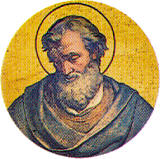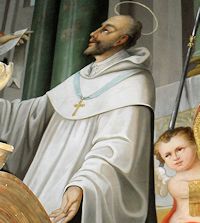35. And Jesus said to them, I am the bread of life: he that comes to me shall never hunger; and he that believes in me shall never thirst.
36. But I said to you, That you also have seen, and believe not.
37. All that the Father gives me shall come to me; and him that comes to me I will in no wise cast out.
38. For I came down from heaven, not to do mine own will, but the will of him that sent me.
39. And this is the Father's will which has sent me, that of all which he has given me I should lose nothing, but should raise it up again at the last day.
40. And this is the will of him that sent me, that every one which sees the Son, and believes in him may have everlasting life: and I will raise him up at the last day.
CHRYS. Our Lord now proceeds to set forth mysteries; and first speaks of His Divinity: And Jesus said to them, I am the bread of life. He does not say this of His body, for He speaks of that at the end; The bread that I will give you is My flesh. Here He is speaking of His Divinity. The flesh is bread, by virtue of the Word; this bread is heavenly bread, on account of the Spirit which dwells in it.
THEOPHYL. He does not say, I am the bread of nourishment, but of life, for, whereas all things brought death, Christ has quickened us by Himself. But the life here, is not our common life, but that which is not cut short by death: He that comes to Me shall never hunger; and, He that believes in Me shall never thirst.
AUG. He that comes to Me, i.e. that believes in Me, shall never hunger, has the same meaning as shall never thirst; both signifying that eternal society, where there is no want.
THEOPHYL. Or, shall never hunger or thirst, i.e. shall never be wearied of hearing the word of God, and shall never thirst as to the understanding: as though He had not the water of baptism, and the sanctification of the Spirit.
AUG. You desire bread from heaven: but, though you have it before you, you eat it not. This is what I told you: But I said to you, that you also have seen Me, and believe not.
ALCUIN. As if He said, I did not say what I did to you about the bread, because I thought you would eat it, but rather to convict you of unbelief. I say, that you see Me, and believe not.
CHRYS. Or, I said to you, refers to the testimony of the Scriptures, of which He said above, They are they which testify of Me; and again, I am come in My Father's name, and you receive Me not. That you have seen Me, is a silent allusion to His miracles.
AUG. But, because you have seen Me, and believed not, I have not therefore lost the people of God: All that the Father gives Me, shall come to Me; and him that comes to Me, I will in no wise cast out.
BEDE. All, He said, absolutely, to show the fullness of the number who should believe. These are they which the Father gives the Son, when, by His secret inspiration, He makes them believe in the Son.
ALCUIN. Whomsoever therefore the Father draws to belief in Me, he, by faith, shall come to Me, that he may be joined to Me. And those, who in the steps of faith and good works, shall come to Me, I will in no wise cast out; i.e. in the secret habitation of a pure conscience, he shall dwell with Me, and at the last I will receive him to everlasting felicity.
AUG. That inner place, whence there is no casting out, is a great sanctuary, a secret chamber, where is neither weariness, or the bitterness of evil thoughts, or the cross of pain and temptation: of which it is said, Enter you into the joy of your Lord.
CHRYS. The expression, that the Father gives Me, shows that it is no accident whether a man believes or not, and that belief is not the work of human cogitation, but requires a revelation from on high, and a mind devout enough to receive the revelation. Not that they are free from blame, whom the Father does not give, for they are deficient even in that which lies in their own power, the will to believe. This is a virtual rebuke to their unbelief, as it shows that whoever does not believe in Him, transgresses the Father's will. Paul, however, says, that He gives them up to the Father: When He shall have given up the kingdom to God, even the Father. But as the Father, in giving, does not take from Himself, so neither does the Son when He gives up. The Son is said to give up to the Father, because we are brought to the Father by Him. And of the Father at the same time we read, By Whom you were called to the fellowship of His Son. Whoever then, our Lord says, comes to Me, shall be saved, for to save such I took up flesh: For I came down from heaven not to do Mine own will, but the will of Him that sent Me. But what? Have you one will, He another? No, certainly. Mark what He says afterwards; And this is the will of Him that sent Me, that every one which sees the Son, and believes in Him, should have everlasting life. And this is the Son's will too; For the Son quickens whom He will. He says then, I came to do nothing but what the Father wills, for I have no will distinct from My Father's: all things that the Father has are Mine. But this not now: He reserves these higher truths for the end of His ministry.
AUG. This is the reason why He does not cast out those who come to Him. For I came down from, heaven not to do Mine own will, but the will of Him that sent Me. The soul departed from God, because it was proud. Pride casts us out, humility restores us. When a physician in the treatment of a disease, cures certain outward symptoms, but not the cause which produces them, his cure is only temporary. So long as the cause remains, the disease may return. That the cause then of all diseases, i.e. pride, might be eradicated, the Son of God humbled Himself. Why are you proud, O man? The Son of God humbled Himself for you. It might shame you, perhaps, to imitate a humble man; but imitate at least a humble God. And this is the proof of His humility: I came not to do Mine own will, but the will of Him that sent Me. Pride does its own will; humility the will of God.
HILARY. Not that He does what He does not wish. He fulfills obediently His Father's will, wishing also Himself to fulfill that will.
AUG. For this very reason therefore, I will not cast out Him that comes to Me; because I came not to do Mine own will. I came to teach humility, by being humble Myself. He that comes to Me, is made a member of Me, and necessarily humble, because He will not do His own will, but the will of God; and therefore is not cast out. He was cast out, as proud; he returns to Me humble, he is not sent away, except for pride again; he who keeps his humility, fails not from the truth. And further, that He does not cast out such, because He came not to do His will, He shows when He says, And this is the Father's will which has sent Me, that of all which He has given Me, I should lose nothing. Every one of an humble mind is given to Him: It is not the will of your Fatter, that one of these little ones should perish. The swelling ones may perish; of the little ones none can; for except you be as a little child, you shall not enter into the kingdom of heaven.
AUG. They therefore who by God s unerring providence are foreknown, and predestined, called, justified, glorified, even before their new birth, or before they are born at all, are already the sons of God, and cannot possibly perish; these are they who truly come to Christ. By Him there is given also perseverance in good to the end; which is given only to those who will not perish. Those who do not persevere will perish.
CHRYS. I should lose nothing; He lets them know, he does not desire his own honor, but their salvation. After these declarations, I will in no wise cast out, and I should lose nothing, He adds, But should raise it up at the last day. In the general resurrection the wicked will be cast out, according to Matthew, Take him, and cast him into outer darkness. And, Who is able to cast both soul and body into hell. He often brings in mention of the resurrection for this purpose: viz. to warn men not to judge of God's providence from present events, but to carry on their ideas to another world.
AUG. See how the twofold resurrection is expressed here. He who comes to Me, shall forthwith rise again; by becoming humble, and a member of Me. But then He proceeds; But I will raise him up at the last day. To explain the words, All that the Father has given Me, and, I should lose nothing, He adds; And this is the will of Him that has' sent Me, that every one which sees the Son, and believes in Him, may have everlasting life: and I will raise him up on the last day. Above He said, Whoso hears My word, and believes in Him that sent Me: now it is, Every one which sees the Son, and believes in Him. He does not say, believe in the Father, because it is the same thing to believe in the Father, and in the Son; for us the Father has life in Himself, even so has He given to the Son to have life in Himself, and again, That whoso sees the Son and believes on Him, should hare everlasting life; i.e. by believing, by passing over to life, as at the first resurrection. But this is only the first resurrection, He alludes to the second when He says, And I will raise him up at the last day.
Catena Aurea John 6


 Stephen Harding, son of an English noble, was born at Sherborne in Dorsetshire, England, about the middle of the eleventh century. He consecrated himself to the monastic life in the Abbey of Sherbonne in Dorsetshire, where he received his early education. He later studied in Paris and Rome, where he pursued a brilliant course in humanities, philosophy and theology.
Stephen Harding, son of an English noble, was born at Sherborne in Dorsetshire, England, about the middle of the eleventh century. He consecrated himself to the monastic life in the Abbey of Sherbonne in Dorsetshire, where he received his early education. He later studied in Paris and Rome, where he pursued a brilliant course in humanities, philosophy and theology. 